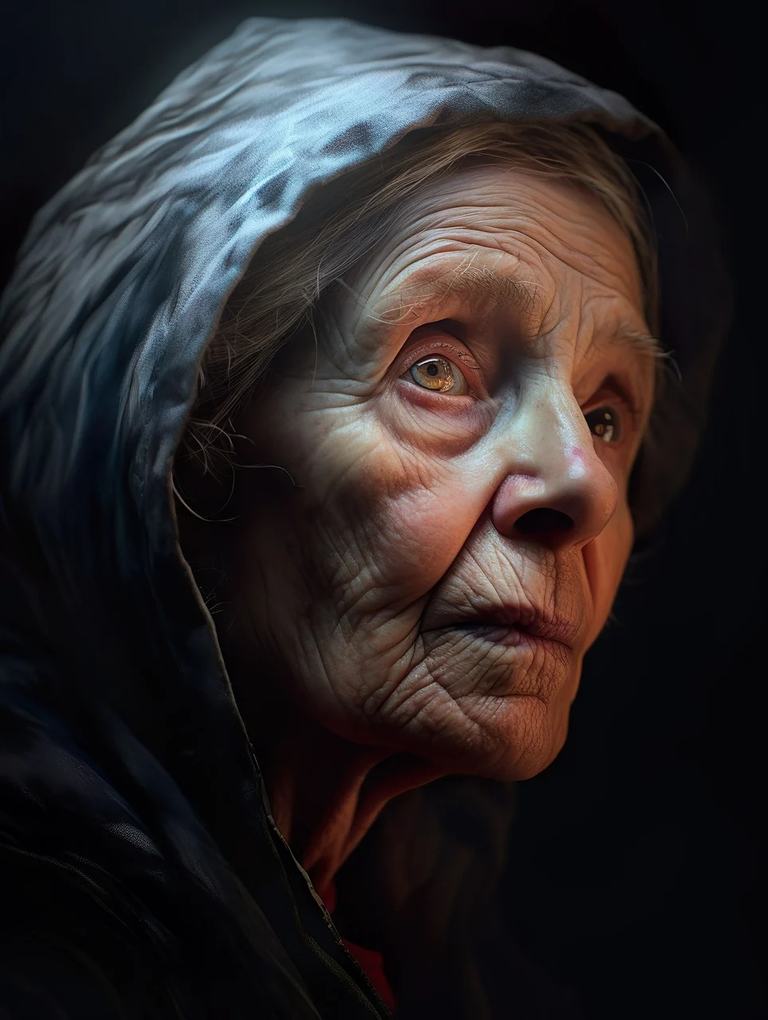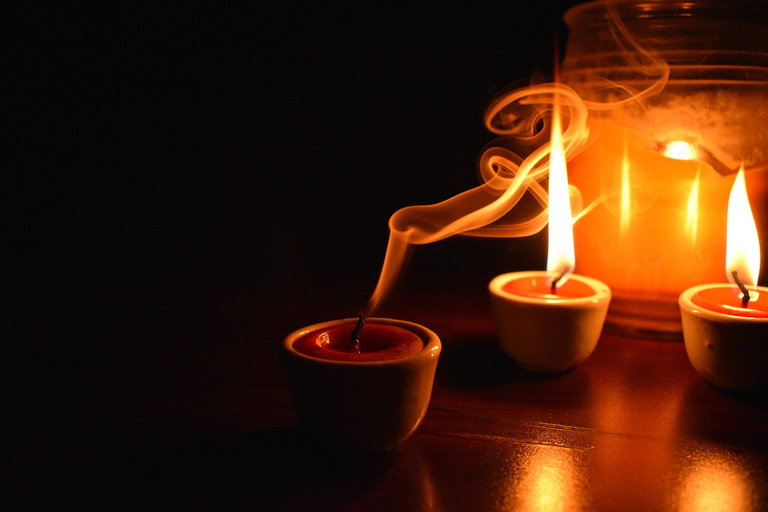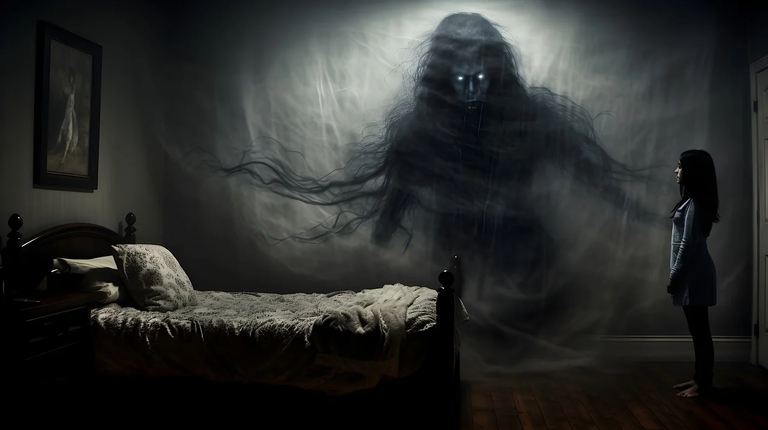Creative Nonfiction: A word called resignation/ Una palabra llamada resignación

A word called resignation

"Pilato, Pilato, I tie your tail, if the keys don't appear, I won't untie you," said the grandmother, tying the end of a handkerchief, and after a while, the keys appeared and the grandmother untied the knot of the handkerchief.
Other times, she would cure illnesses:
"Take a green milky plant and make an opening in it. Through that opening you are going to add water, honey and baking soda. Then you close it and put it in the serene for three nights. On the fourth night you open it and drink the liquid. That will help purge the organism," Grandma recommended to anyone who asked her.
But the day she died, she took all that knowledge with her because even though Dad had Indian blood, he didn't believe in such things:
"In this house I don't want them to do anything about rituals, or superstitions, those things are for ignorant people". -Dad ordered.

"Mother dear, how you left me!" -my dad shrieked and the walls shook with his crying. Dad fell to his knees like a small child, doubled over with grief, and I sensed that with that gesture the house was falling apart.
That same day and the next, which was the burial, Dad took care of the funeral arrangements. While all the rest of us were swept away by grief, Dad looked like a marble statue: frozen and stiff. We didn't see him cry anymore, but he did cloak himself in a strange silence, as if he found it hard to speak or had run out of words.
When we returned from the cemetery, Dad ordered that Grandma's room remain untouched and that her personal things be left where Grandma had left them, as if she were still with us. No one objected to that decision, not only because Dad was the head of the family, but also because we believed that those things were part of the memory of the woman who had given us so much.

"Grandma, why did you go away, why did you leave me alone?" -I would sob and hug her dresses, feeling her scent close to me, as if with that gesture I could feel her arms around me. I would also put on her necklaces, her shoes and look at myself in the mirror in which grandmother had seen herself all her life. In her bed, I would fall asleep and with swollen eyes, I would go to school the next day, where I remained taciturn, erratic, absent.
A few weeks after Grandma's death, I began to develop a fever. At first they thought it was a virus, but when the medications had no effect, they had to take me to the doctor with a fever that reached 40°C. The doctor's recommendations didn't help either and the fever continued for about three days.
On the third day of fever, a woman passed in front of my house and as if someone had asked her, she said to my dad:
"As the father of the family, who is in charge of the house, you must scare the soul of Mrs. Eugenia because otherwise, she is going to take your daughters away".

At about 9:00 p.m., they took my temperature and found out that it was 39°C. They were about to give me some medicine when my dad found a long, very long hair, about 20 meters long, white, rolled up between my sheets. Dad turned pale and I heard him roar like an enraged lion.
"Get out of this house, maíta. Go away and leave my daughters alone. You're dead, you're dead. Get out of here," Dad shouted as if he were crazy. I started crying as if I understood that I would definitely never see my grandmother again. So much so that I dreamed that night that my grandmother let go of my hand and said goodbye to me.
The next day, the fever had passed and my father had gathered all my grandmother's things. I understood, then, that grandma's first death was when she was taken out of the house in a coffin; the second and final death was when dad put her things in a box.

All images are free of charge and the text is my own, translated in Deepl


Thank you for reading and commenting. Until a future reading, friends
![Click here to read in spanish]
Una palabra llamada resignación
La primera vez que murió la abuela, yo tenía quince años. Abuela era una indígena que sabía cuáles eran las oraciones para hacer llover, para quitar el mal de ojo, para curar las lombrices y hasta para encontrar las cosas que se perdían:
_Pilato, Pilato, la cola te ato, si no aparecen las llaves, no te desato –decía la abuela amarrando la punta de un pañuelo y al cabo de un rato, aparecían las llaves y la abuela desamarraba el pañuelo.
Otras veces, curaba enfermedades:
_Toma una lechosa verde y le haces una abertura. Por esa abertura vas a añadir agua, miel y bicarbonato. Luego cierras y lo pones en el sereno por tres noches. A la cuarta noche abres y tomas el líquido. Eso va a ayudar purgar el organismo –recomendaba la abuela a cualquiera que le preguntaba.
Pero el día que murió, se llevó todo aquel conocimiento porque aunque papá tenía sangre indígena, no creía en aquellas cosas:
_En esta casa no quiero que hagan nada de rituales, ni supersticiones, que esas cosas son de gente ignorante. –ordenaba papá.
La primera vez que la abuela murió fue un 4 de julio y nos avisaron en la madrugada. Recuerdo que cuando escuché que sonó el teléfono, intuí que había pasado algo malo. Solo cuando escuché el grito desgarrador de mi padre, en mitad de la sala, fue cuando tuve la certeza de que había ocurrido una desgracia:
_¡Madre querida, cómo me dejaste! –chilló mi papá y las paredes temblaron con su llanto. Papá cayó arrodillado como un niño pequeño, doblegado por el dolor, y presentí que con aquel gesto se desmoronaba la casa.
Ese mismo día y al siguiente, que fue el entierro, papá se encargó de los trámites fúnebres. Mientras que todos los demás nos dejábamos arrastrar por el dolor, papá parecía una estatua de mármol: helada y tiesa. No lo vimos llorar más, pero sí se cubrió de un silencio extraño, como si hablar le costara mucho o se hubiese quedado sin palabras.
Al regreso del cementerio, papá ordenó que la habitación de la abuela permaneciera intacta y que sus cosas personales la dejaran donde las había dejado la abuela, como si ella continuara entre nosotros. Nadie se opuso a aquella decisión, no solo porque papá era el jefe de la familia, sino porque también creíamos que aquellas cosas eran parte de la memoria de aquella mujer que nos había dado tanto.Todas las noches, yo me encerraba en la habitación de la abuela y me ponía a llorar:
_Abuelita, por qué te fuiste, por qué me dejaste sola. –sollozaba y me abrazaba a sus vestidos, sintiendo su olor cerca, como si con aquel gesto pudiera sentir sus brazos alrededor mío. También me ponía sus collares, sus zapatos y me miraba en el espejo en el que la abuela se había visto toda la vida. En su cama, me quedaba dormida y con los ojos hinchados, iba al día siguiente al liceo, donde permanecía taciturna, errática, ausente.
Unas semanas después de la muerte de la abuela, comencé a presentar fiebre. Al principio creyeron que era un virus, pero cuando los medicamentos no surtieron efecto, tuvieron que llevarme al médico con una fiebre que alcanzaba los 40°C. Las recomendaciones del médico tampoco sirvieron y la fiebre continuó como por tres días.
Al tercer día de fiebre, una mujer pasó por frente a mi casa y como si alguien le hubiese preguntado, le dijo a mi papá:
_Como padre de familia, que está al mando de la casa, debes espantar el alma de la señora Eugenia porque de lo contrario, se va a llevar a tus hijas.
Papá no le creyó, pero aquellas palabras de advertencia le quedaron como un eco en los oídos. ¿Cómo podía mi abuela, después de muerta, seguir en la casa?, se preguntaba mi papá, pero la noche de ese día tendría la respuesta.
Como a las 9 de la noche, me tomaron la temperatura y se dieron cuenta que la tenía en 39°C. Ya me iban a dar medicamento, cuando papá encontró un cabello largo, muy largo, como de 20 metros, blanco, enrollado entre mis sábanas. Papá palideció y lo escuché rugir como un león enfurecido
_Vete de esta casa, maíta. Vete y deja a mis hijas tranquilas. Estás muerta, estás muerta. Sal de aquí –gritó papá como si estuviera loco. Yo me puse a llorar como si entendiera que definitivamente no vería más nunca a mi abuela. Tanto así, que esa noche soñé que mi abuela me soltaba la mano y se despedía de mí.
Al día siguiente, la fiebre había pasado y mi padre había recogido todas las cosas de mi abuela. Entendí, entonces que la primera muerte de la abuela fue cuando la sacaron en un ataúd de la casa; la segunda y definitiva, fue cuando papá metió sus cosas en una caja.
I had goosebumps. I played every scene out in my mind. Watching Grandma do her thing with the healings and whatnot. I imagined how her death caused his dad to be pain-stricken. The wailing, the burial. Everything. I applaud the detailed description.
However, it was really nice to realize that sometimes when people die, especially those we love, their presence stays with us and because we yearn for them, they might try to take us with them (granting our heart desires); until we let go of their belongings. I think I am beginning to believe in superstitions, lol.
Nicely written, @nancybriti1
Thank you for your words. The best thing about this whole story is that it is real. There is nothing fictional about it. And life, sometimes, seems like a fantastic story full of incredible things. Greetings and thank you very much.
Yuuuupi! I am happy and honored. Thank you, friends
I was quite confused. Why would your grandmother make you ill? Usually, attachment (grandmother's lingering presence after death) such as that doesn't have a dominion over living, unless it's a bad one (? )... Anyway, about the stuff of dead loved ones, we usually burn it because our superstition here says that the stuff of the dead shouldn't be with us because they cling to it. I guess the concept of her grandma's attachment was kind of similar to ours. It was a good thing that her father took her things away.
I really enjoyed reading your story... I like how you describe feelings. I really felt every emotion—the grief, the longing, the horror, and the rage. It was indeed well written (•͈ᴗ•͈)...
In my country it is the same. But sometimes we like to keep some things as souvenirs. The detail is that it is believed that some things can keep the soul of the deceased, like mirrors, for example. Likewise, it is believed that daily mourning the loss, does not let the deceased rest. These are beliefs that sometimes people believe or not. Greetings
Congratulations @nancybriti1! You have completed the following achievement on the Hive blockchain And have been rewarded with New badge(s)
Your next target is to reach 3500 replies.
You can view your badges on your board and compare yourself to others in the Ranking
If you no longer want to receive notifications, reply to this comment with the word
STOPThank you for the information
That's great @nancybriti1! We're excited to see your commitment to Hive! Keep it up!
BTW, we noticed we miss your support for our proposal. Mays we ask you to check it out and consider supporting it?
All you need to do is to click on the "support" button on this page: https://peakd.com/proposals/248.
Thank you!
Oh wow...
This was something.
At first, I thought you made a mistake because due to English being -I think it's- a borrowed language for you.
Then as I read onto the last line did i finally understand.
Lovely wordsmithing✨
Yes, my native language is Spanish. I translate with Deepl. Thank you for commenting.
The world has many mysteries and your story explores some of these mysterious through an indigenous perspective. For a moment, I thought it was fiction, but then I saw that it was nonfiction, so you made great use of narrative devices. The opening line is one of the strongest I've seen:
Excellent hook and great tale.
Thank you, my friend. I really appreciate your comment and appreciation. Hugs
Keep up the good work. 👏
Recognized by Mystic artist Gudasol
You are loved.
Interested to to help music map cXc.world spread more good vibes on Hive?.